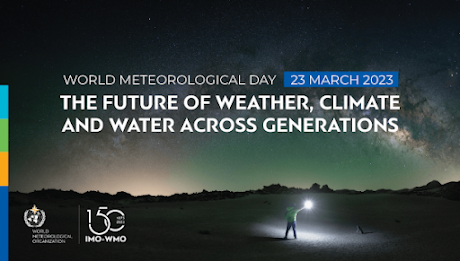FORUM: “The future of weather, climate and water across generations.” World Meteorological Day 2023. As a result of heat-trapping greenhouse gases, the average global temperature is now more than 1° Celsius higher today compared to 150 years ago. Our weather is more extreme, our ocean is warmer and more acidic, sea levels have risen and glaciers and ice are melting. The rate of change is accelerating. We need urgent action now to slash emissions and to ensure that future generations can both survive and thrive on our planet. The good news is that rapid scientific and technological advances have greatly improved the accuracy of weather forecasts and life-saving early warnings. Big data is being exchanged more freely among a wider community than ever before, and there are new tools including machine learning and Artificial Intelligence. There has been significant progress to monitor, simulate and project the global climate to support decision-making. Our weather, climate and water cycle will be different in future than in the past. Weather, climate and hydrological services will help us tackle the associated challenges and seize the opportunities. Forecasts of what the weather will BE are no longer enough. Impact-based forecasts that inform the public of what the weather will DO are vital to save lives and livelihoods. Yet one in three people are still not adequately covered by early warning systems. Follow the conversations with the hashtags: #WorldMetDay, #23March, #Meteorology, #Climatology, #Hydrology, #weather.
On this World Meteorological Day, humanity faces a difficult truth: climate change is making our planet uninhabitable.
Every year of insufficient action to keep global warming below 1.5 degrees Celsius drives us closer to the brink, increasing systemic risks and reducing our resilience against climate catastrophe. As countries hurtle past the 1.5-degree limit, climate change is intensifying heatwaves, droughts, flooding, wildfires and famines, while threatening to submerge low-lying countries and cities and drive more species to extinction.
This year’s theme — The Future of Weather, Climate and Water Across Generations — compels us all to live up to our responsibilities and ensure that future generations inherit a better tomorrow.
That means accelerating actions to limit temperature rise to 1.5 degrees, through scaled-up mitigation and adaptation measures.
It means radically transforming our energy and transportation systems, breaking our addiction to fossil fuels, and embracing a just transition to renewable energy.
It means developed countries providing a revolution of financial and technical support to developing countries as they mitigate emissions, adapt to a renewable future, build resilience against extreme weather events, and address the loss and damage resulting from climate change.
And it means living up to the promise made last World Meteorological Day to ensure that early warning systems against climate disasters cover every person in the world. Thirty countries have now been identified for accelerated implementation this year.
2023 must be a year of transformation, not tinkering.
It’s time to end the relentless — and senseless — war on nature, and deliver the sustainable future that our climate needs, and our children and grandchildren deserve.
U.N. Secretary-General.
There is increasing momentum behind the ambitious drive to ensure that life-saving early warning systems cover everyone in the next five years. The Early Warnings for All Initiative, launched by UN Secretary-General António Guterres on World Meteorological Day 2022 was endorsed at COP27 in Sharm-el-Sheikh and has won support from developed and developing countries, from the UN family and the private sector.
Early warnings work. They must work for everyone.
Half of WMO Members still do not have adequate Multi-Hazard Early Warning Systems and we need to fill the gaps in the basic observing system, especially in Least Developed Countries and Small Island Developing States.
Early warnings are the low-hanging fruit of climate change adaptation – which is no long a luxury but a must. According to the World Economic Forum, in the next ten-year time frame, failure to mitigate climate change, failure of climate change adaptation and natural disasters are the highest risks for the global economy.
The World Meteorological Day 2023 ceremony took place on Thursday, 16 March 2023 at WMO Headquarters in Geneva. This was in view of the UN Water conference in New York from 22-24 March.
 |
World Meteorological Day 2023 Ceremony.
16 March 2023 at 14:30-16:30 (GMT+1).
WMO Headquarters, Geneva, Switzerland.
PROGRAMME
Opening
- Prof. Petteri Taalas, Secretary-General of the World Meteorological Organization (WMO)
Official Addresses
- H.E. Juerg Lauber, Ambassador of Switzerland to the UN
- H.E. Mr M. Ahmed Ihab Gamaleldin, Ambassador of Egypt to the UN – on COP27
- H.E. Mr Ahmed Aljarman, Ambassador of UAE to the United Nations – on COP28
Speakers
- Ms Neo Gim Huay, Managing Director, Centre for Nature and Climate at the World Economic Forum (WEF)
- Prof. Ed Hawkins, Professor of Climate Science at the University of Reading and member of the National Centre for Atmospheric Science, creator of Show Your Stripes
- Saliqa Amin and Maximilian Schneider, young representatives of the 2023 FerMUN Conference.


No comments:
Post a Comment